|
De Amerikaanse schrijfster, uitgeefster en politiek
activiste Rebecca Walker werd
geboren op 17 november 1969 in Jackson, Mississippi. Zie ook alle tags voor Rebecca
Walker op dit blog.
Uit:
Baby Love
And then I had
what could only be the first twinges of the maternal instinct. Healthy and
robust? A huge smile spread across my face. That's my baby! And then it was as
if the synapses in my brain sending exploratory signals to my uterus finally
made contact. Aye, mate, is it a go down there? Yes, yes, Captain, we're full
steam ahead!
I was convinced
that getting off the phone would exponentially increase my chances of reverting
to not-pregnant, but I released Becky anyway and stumbled over to the bathroom,
where Glen, my life partner and father of our soon-to-be-born baby, was
shaving. I looked into his eyes and tried to keep myself from screaming and
jumping up and down. We did it, I said. He grinned. Well, I guess that puts the
whole motility question to rest. And I said, I guess it does. Then I wrapped my
arms around him and buried my face in his chest, and he wrapped his arms around
me and rested his chin on the top of my head.
I was in ecstatic
bliss for about ninety seconds, and then it hit me: an avalanche of dread that
took my breath away. Pregnant? A baby? What have I done? I looked at Glen. He
was going through his own reality check, which brought me even closer to the
brink of total hysteria. But then, before I could burst into tears and run
screaming out of the room, he pulled me into his arms. You are going to be a
fantastic mother, he said to me, to my fear. His love overwhelmed me, and I
started to cry big, wet tears onto his favorite black shirt.
We're going to have
a baby.

Rebecca
Walker (Jackson, 17 november 1969)
De Nederlandse dichter en schrijver Joost van den Vondel
werd geboren op 17 november 1587 in Keulen. Zie ook Zie ook alle tags
voor Joost van den Vondel op dit blog.
Stabat Mater
Jezus nat bekreten moeder
Stond bij 't kruis, waar ons Behoeder,
Haar beminde zoon, aan hing;
En haar docht, terwijl ze steende,
Hem betreurde en drukkig weende,
Dat een zwaard door 't harte ging.
Och! hoe drukkig, hoe vol rouwe
Was die zegenrijkste vrouwe,
Moeder van Gods enig kind?
Die, met een weemoedig harte,
Levend aanzag al de smarte
Van haar vrucht, bij God bemind.
Och! wie zou in 't hart niet snijden,
Zo hij, in dat deerlijk lijden,
Christus' lieve Moeder zag?
Och! wie zou zich niet bedroeven,
Zag hij 't hart beklemd van schroeven,
Om de Zoon, die 'r onder lag?
Zij zag Jezus pijn en stramen
Lijden, om ons al te zamen,
En hem sterven met geschal,
Toen die Waarde en Uitverkozen
Treurig, als een troosteloze,
Zijne geest aan God beval.
Bron van moederlijke minne,
Stort me mee 't gevoelen inne
Van meedogen en geklag.
Doe mijn koude hart verlangen
Om mijn Heiland aan te hangen,
Dat ik hem behagen mag.
Heilge Moeder, allerkuiste,
Druk de wonden des Gekruiste
Krachtelijk in mijn gemoed.
Laat ik ook met u bezuren
Uw gewonde Zoons kwetsuren,
Die mij vrijkocht met zijn bloed.
Dat ik ijvrig u geleie
En 't gekruiste Lam beschreie
Al de dagen die ik leef.
'k Wens uw kruis te helpen dragen,
En bij 't kruis met u te klagen,
Schoon een ander u begeef.
Puik der maagdelijke loten,
Wil mijn bede niet verstoten:
Laat mij aan uw zijde staan,
Christus dood mijn ziel genezen:
Laat ik die deelachtig wezen:
Laat ze in 't hart geschilderd staan.
Laat zijn hartkwetsuur mij raken,
En zijn bloed mij dronken maken
In de liefde van Gods Zoon.
Reine Maagd! Gij doet mij blaken:
Uw gebed zal voor mij waken
En mij vrijen voor Gods troon.
Laat het kruis mijn ziel bedekken,
Christus dood mijn schild verstrekken
En mij koestren met genâ.
Als dit lichaam komt te sterven,
Laat mijn ziel met blijdschap erven
't Hemels Paradijs hierna.
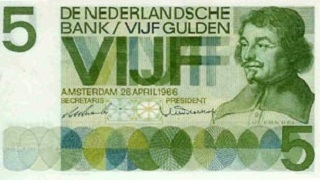
Joost van den Vondel (17 november 1587 5 februari
1679)
Op 5 gulden biljet uit 1966
De Britse schrijver journalist en polemist Auberon Alexander Waugh
werd geboren op 17 november 1939 in Dulverton, Somerset. Zie alle tags voor Auberon
Waugh op dit blog.
Uit: Will This Do? An Autobiography
Evelyn Waugh always
referred to him as my rival, Mr Coggins, and was being only partly humorous.
She actually preferred the gardeners company to that of anyone else. His
slightly implausible deference, the embarrassingly apparent sub-text of all
advice, the extreme ordinariness of every opinion he advanced, appealed to her
deepest sense of social propriety. This was the most natural and acceptable
form of human relationship.
'They do say, madam,
that if you see a crow with a broken wing, that means 'twill be a good year for
raspberries,' he would say in his fine Somerset voice, and she would lap it up.
In the week my father
died, Coggins disappeared. My mother got it into her head that I had murdered
him (Coggins) and put his corpse in the boot of my car before driving back to
Chilton Foliat. I do not know why she should have reached this conclusion, but suppose
it must have been the product of stress. In fact he had been out on a blind,
something which is well known among Somerset farming folk. But by the time we
moved down to Combe Florey in October 1971, Walter Coggan, too, had died, in
the way that elderly men have always tended to do. The clergyman, at his
funeral, said: We have memories of Walter which time can never alter.
Obviously, he was most
missed by his widow and family, but I think it was the loss of Coggins which
reconciled my mother to the idea that the little Waughs, as my father used to
call us, should move into the main part of the house, and she would move into a
more or less disused wing, equipped with its own kitchen and other
appointments.
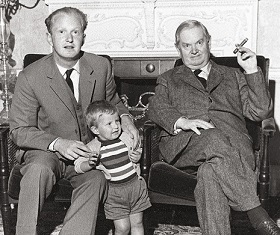
Auberon Waugh (17 november 1939 -16 januari 2001)
Auberon, Alexander en Evelyn Waugh in 1965.
De Amerikaanse schrijver Christopher Paolini werd geboren in Los
Angeles County, California, op 17 november 1983. Zie ook alle tags voor
Christopher Paolini op dit blog.
Uit: Brisingr
The elf smiled, revealing teeth that were
sharper than normal. I am Blödhgarm,
son of Ildrid the Beautiful. He
introduced the other elves in turn before continuing: We bring you glad
tidings from Queen Islanzadí; last night our spellcasters succeeded in
destroying the gates of Ceunon. Even as we speak our forces advance through the
streets toward the tower where Lord Tarrant has barricaded himself. Some few
still resist us, but the city has fallen, and soon we shall have complete
control over Ceunon.
Nasuadas guards and the Varden gathered
behind her burst into cheers at the news. She too rejoiced at the victory, but
then a sense of foreboding and disquiet tempered her celebratory mood as she
pictured elves especially ones as strong as Blödhgarm invading human homes.
What unearthly forces have I
unleashed? She wondered. These are glad tidings indeed, she said, and
I am well pleased to hear them. With Ceunon captured, we are that much closer
to Urûbaen, and thus to Galbatorix and the fulfillment of our dreams. In a
more private voice, she said, I trust that Queen Islanzadí will be gentle with
the people of Ceunon, with those who have no love of Galbatorix but lack the
means or the courage to oppose the Empire.
Queen Islanzadí is both kind and merciful to
her subjects, even if they are her unwilling subjects, but if anyone dare
oppose us, we shall sweep them aside like dead leaves before an autumn storm.
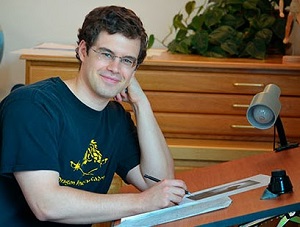
Christopher
Paolini (Los Angeles County, 17 november 1983)
De Israëlische
dichteres en schrijfster Dahlia Ravikovitch werd geboren op 17 november 1936 in een
voorstad van Tel Aviv. Zie ook alle tags voor Dahlia Ravikovitch op dit
blog.
A Wicked Hand
Smoke rose in the
slanted light
And my daddy was hitting me.
Everyone there laughed at the sight,
Im telling the truth, and nothing but.
Smoke rose in the slanted light.
Daddy slapped the palm of my hand.
He said, Its the palm of a wicked hand.
Im telling the truth, and nothing but.
Smoke rose in the slanted light
And Daddy stopped hitting me.
Fingers sprouted from
the wicked hand,
Its works endure and will never end.
Smoke rose in the slanted light.
Fear singes the wicked
hand.
Daddy stopped hitting me
But that fear endures and will never end.
Delight
There did I know a
delight beyond all delight,
And it came to pass upon the Sabbath day
As tree boughs reached for the sky with all their might.
Round and round like a river streamed the
light,
And the wheel of the eye craved the sunwheel that day.
Then did I know a delight beyond all delight.
The heads of the bushes blazed, insatiable
bright
Sunlight striking the waves, igniting the spray.
It would swallow my head like a golden orange, that light.
Water lilies were gaping their yellow bright
Mouths to swallow the ripples and reeds in their way.
And indeed it came to pass on the Sabbath day
As tree boughs lusted for the sky with all their might,
And then did I know a delight beyond all delight.
Vertaald door Chana Bloch and Chana Kronfeld
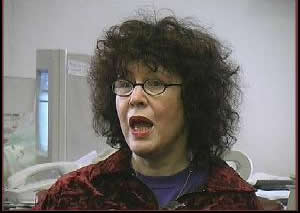
Dahlia
Ravikovitch (17 november 1936 21 augustus 2005)
De Duitse dichter en schrijver Max Barthel
werd geboren in Dresden-Loschwitz op 17 november 1893. Zie ook alle tags voor Max Barthel op dit blog en ook mijn
blog van 17 november 2010.
Uit: Der Mensch am Kreuz
Endlos dehnen sich die Felder und Wälder in
Ostpreußen und verlieren sich nach der Steppenewigkeit Rußlands. Wie eine
blitzende Kette sind die vielen Seen in die bäuerliche Erde verstreut. Darüber
wölbt sich der gewaltige Himmel. Im freien Raum zwischen den Wolken und den
Straßen sausen im Winter die krachenden Stürme. Die Menschen, die hier wohnen,
sind ernst und verschlossen. Viel Schwärmerei und Schwermut ist in ihnen. Das
nahe russische Blut ist auch in ihre Adern verspritzt.
Die Erlers stammten aus dem Rheinland. Über
zweihundert Jahre saßen sie schon als Pioniere und Vorposten unter Masuren und
Litauern hart an der russischen Grenze. Sie waren meistens Lehrer und
Organisten, liebten die deutsche Sprache und ihr schönstes Kind, die
Dichtkunst. Sie liebten auch Mozart und Beethoven, und wenn sie heirateten, so
nahmen sie Bauerntöchter aus deutschem Blut.
Paul Erler heiratete in der Mitte des vorigen
Jahrhunderts eine gewisse Klara Scheffler. Sie lebten glücklich zusammen. Vier
Kinder wurden ihnen geboren. Zwei Kinder starben im jugendlichen Alter. Die
Erlers waren nicht wohlhabend. In dem armseligen Schulhäuschen bewohnten sie
zwei kleine Zimmer. An den Gräbern wurde Chopin gespielt und nicht Mozart, aber
in der Kirche saß der Organist nach jedem Begräbnis stundenlang an der Orgel
und ließ die Pfeifen wie das ewige Gewitter der Schöpfung brausen. Die kahle
Kirche war sein Haus, seine weite Welt, sein Riesenschiff. Dort löste er sich
aus der Enge des Daseins und vom versteinerten Strand der Armut, dort
phantasierte er in die Sterne hinein.
An einem Frühlingstag, als das zweite Kind starb,
es war ein Mädchen, wurde ihm ein Sohn geboren. Da glaubte der kleine
Orgelspieler und Lehrer, die Hand des barmherzigen Gottes zu erkennen, dem auch
der Tod nur Saat ist für neue Auferstehung. An diesem Frühlingstag spielte er
auf seiner Orgel Bach und Haydn. Ihm war, als die Fugen brausten, als sei kein
Kind gestorben, ihm war, als beginne ein kleiner, geliebter Mensch nur ein
zweites Dasein. Das Mädchen, das gestorben war, hieß Maria. Den Sohn nannte er
Tobias. Trauer und Freude, Licht und Schatten, Tod und Leben waren um den
ersten Schrei dieses Kindes versammelt.
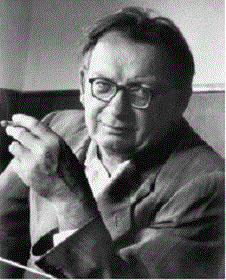
Max Barthel (17 november 1893 28 juni 1975)
De Franse
schrijver Pierre Véry werd op 17
november 1900 in Bellon geboren. Zie ook alle tags voor Pierre Véry op dit blog en ook mijn blog van 17 november 2009.
Uit: Goupi-Mains
rouges à Paris
Le magot, -
Mains-Rouges s'en moquait bien !
Sa seule richesse, c'était ses souvenirs. Et Dieu sait qu'ils n'étaient pas
gais !
Lison, - sa soeur...Tellement elle était jolie, on n'avait pas trouvé mieux,
comme surnom, que de l'appeler Goupi-la-belle. La Loi l'avait refusée en
mariage à un garçon de l'assistance, parce-que il n'y avait pas d'espoir
d'héritage !
Par peine de coeur, la pauvre
belle s'était jetée dans un puits. Morte,
elle était encore plus belle que de son vivant ; personne n'arrivait à croire
qu'elle ne respirait plus !
Au point que, pour s'habituer à l'idée qu'elle était morte, - vraiment morte -
on avait dû changer son surnom, l'appeler "Goupi-la-Morte"
Dieu merci, Mains-Rouges n'était pas encore fossoyeur, dans ce temps-là. S'il
avait dû creuser sa tombe...
Mais il avait creusé celle de Marie des Goupi, la vieille servante, et celle de
son fils, Jean des Goupi, l'innocent...Celui-là, comme Mains-Rouges, avait aimé
les choses pour elles mêmes, - par pour le plaisir égoïste de les posséder. Les
bêtes, l'herbe des champs, la forêt, ses odeurs et ses voix...
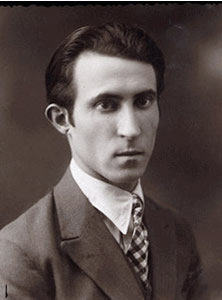
Pierre Véry (17 november 1900 - 12 oktober 1960)
|



